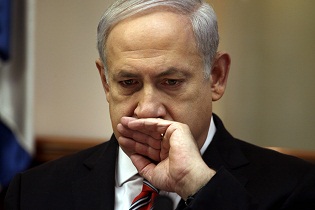The Zionist entity was frustrated on Sunday with the nuclear deal between Iran and world powers in Geneva, with voices slamming the deal a “historic mistake” and others considering it the “greatest diplomatic victory” for Iran
The Zionist entity was frustrated on Sunday with the nuclear deal between Iran and world powers in Geneva, with voices slamming the deal a “historic mistake” and others considering it the “greatest diplomatic victory” for Iran.
 Israeli Prime Minister Benjamin Netanyahu’s spokesman quoted him as saying that what was achieved yesterday in Geneva was not “a historic agreement but rather a historic mistake.”
Israeli Prime Minister Benjamin Netanyahu’s spokesman quoted him as saying that what was achieved yesterday in Geneva was not “a historic agreement but rather a historic mistake.”
“This is a bad agreement that gives Iran what it wanted, including the partial lifting of sanctions while maintaining an essential part of its nuclear program,” said a statement published by Netanyahu’s office, a few hours after the historic agreement was reached in Geneva. Netanyahu also said that Israel is not bound by the international community's nuclear deal and “reserves the right to defend itself.”
Israeli Foreign Minister Avigdor Lieberman also regretted the deal saying: “This agreement is the greatest diplomatic victory of Iran, which has gained recognition for its so-called legitimate right to enrich uranium.”
“We're worried about the agreement but our job is to keep up the warnings,” said Yair Lapid, the Zionist Minister of Finance and part of Netanyahu's coalition government. “We're not comfortable but this warning needs to be done. We have six months until there is (hopefully) a better agreement. We may be the only child in the room saying the king has no clothes but that's what we must do.”
An official in the Prime Minister’s office said the agreement “gives Iran exactly what it wants: a significant easing of sanctions and allows Iran to keep the most significant parts of its nuclear program. The agreement allows Iran to continue enriching uranium and leaves it the centrifuges that enables it create (fissile) material to create nuclear weapons. Likewise, the agreement doesn't lead to dismantling the Arak reactor. The economic pressure on Iran would have led to a much better agreement that would have dismantled Iran's nuclear capability.”
Israeli President Shimon Peres was more cautious in his response, pointing to the fact the agreement was “an interim deal” which allowed time for a diplomatic solution. "Reject terrorism," Peres pleaded with the Iranian people. "Stop the nuclear program. Stop the development of long-range missiles. Israel like others in the international community prefers a diplomatic solution. "But ... if the diplomatic path fails, the nuclear option will be prevented by other means," Peres warned.
“Talks Could've Forced Iran Give up Nukes”
Nafatali Bennett, the Minister of Economy and Commerce, said on Zionist Army Radio that world powers could have used the talks in Geneva that led to the deal “to force Iran to give up its nuclear program rather than freeze it at a point where it can resume work at any time.”
“Iran was on the mat because of the sanctions, but then the West picked it up and gave it something to drink. Israel does not have to be a party to this agreement and has the right to defend its security,” he claimed. “The whole Middle East is affected but the danger to Israel is unique.”
According to media report, the Israeli public were enraged that Netanyahu’s attitude with the US and his spoiling of good relations with President Barack Obama led to such deal.
“Deal Could Jump Start at Syria, Palestine”
Uri Savir, a former Israeli ambassador and president of the The Peres Center for Peace, called the deal an "historic agreement." He said it will go a long way to limit Iran's nuclear program for six months and could also jump start progress on Syria and the Israeli-Palestinian so-called peace process. He lauded Obama and Secretary of State John Kerry "who despite opposition advanced global peace diplomacy."